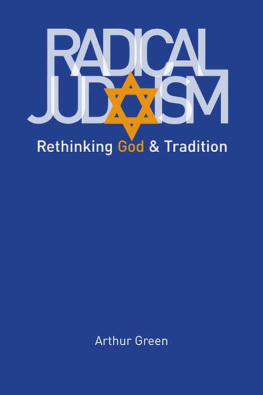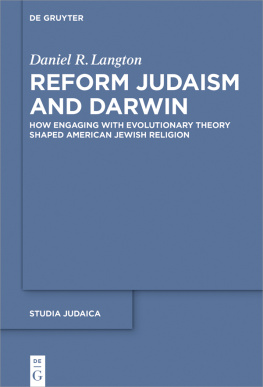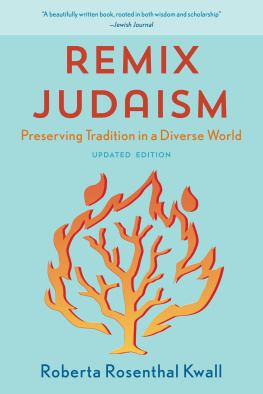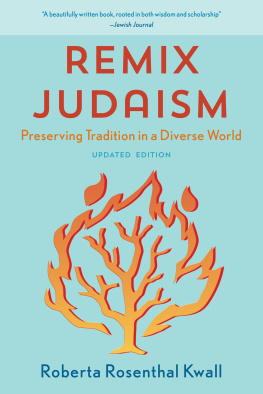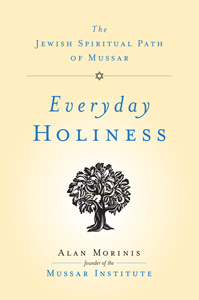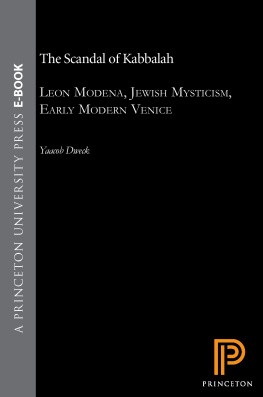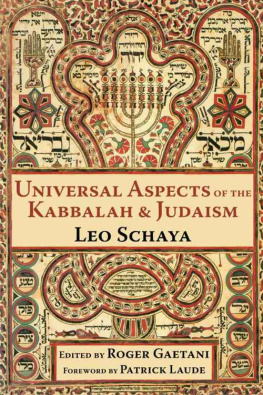RADICAL JUDAISM
The Franz Rosenzweig Lectures in Jewish Theology
and History are sponsored by the Program in Judaic
Studies at Yale University. The Lectures were established
in 1987 by the Estate of Arthur A. Cohen and
are named for theologian Franz Rosenzweig.
Other Volumes in the
Franz Rosenzweig Lecture Series
Available from Yale University Press
Canon and Creativity: Modern Writing and the Authority
of Scripture , by Robert Alter
German Jews: A Dual Identity , by Paul Mendes-Flohr
Freud's Moses: Judaism Terminable and Interminable ,
by Yosef Hayim Yerushalmi
ARTHUR GREEN
Radical Judaism
Rethinking God and Tradition
YALE UNIVERSITY PRESS NEW HAVEN AND LONDON
Published with assistance from the Lewis Stern
Memorial Fund and from the Franz Rosenzweig
Lectures in Jewish Theology and History Fund in the
Program in Judaic Studies at Yale University.
Copyright 2010 by Arthur Green.
This book may not be reproduced, in whole or in part,
including illustrations, in any form (beyond that copying
permitted by Sections 107 and 108 of the U.S. Copyright
Law and except by reviewers for the public press),
without written permission from the publishers.
Set in Janson Oldstyle by Keystone Typesetting, Inc.
Printed in the United States of America.
Library of Congress Cataloging-in-Publication Data
Green, Arthur, 1941
Radical Judaism : rethinking God and tradition /
Arthur Green.
p. cm. (Franz Rosenzweig lecture series)
Includes bibliographical references and index.
ISBN 978-0-300-15232-6 (pbk. : alk. paper)
1. God (Judaism) 2. Spiritual lifeJudaism.
3. JudaismDoctrines. I. Title.
BM 610.G74 2010
296.311dc22 2009033195
A catalogue record for this book is available from the
British Library.
This paper meets the requirements of ANSI/NISO
Z39.48-1992 (Permanence of Paper).
10 9 8 7 6 5 4 3 2 1
For Kathy,
beyond Kabbalah
CONTENTS
PREFACE
This book is an expansion of the Franz Rosenzweig Lectures at Yale University, delivered in the fall of 2006. Funding for these lectures was provided from the estate of the late Arthur Cohen, himself a significant figure in American Jewish religious thought. I am grateful to the Yale faculty in Judaic studies, especially Paula Hyman and Ivan Marcus, for their invitation, hospitality, and encouragement.
Because the lectureship was named for Rosenzweig, I felt it appropriate to reflect on the themes of God, Torah, and Israel, complementing my earlier discussions, in Seek My Face, Speak My Name: A Contemporary Jewish Theology (Northvale, NJ: Jason Aronson, 1992), of Creation, Revelation, and Redemption, thus retracing the well-known Rosenzweigian Star.
The book before you represents some four years as my major intellectual project. In a sense it concludes a theological trilogy that began with Seek My Face and continued in EHYEH: A Kabbalah for Tomorrow (2006). I undertook this project while working as dean, and more recently as rector, of the Hebrew College Rabbinical School, which I helped to establish in 2003. I am grateful to my colleagues and students for both inspiration and questioning, but also for allowing me time to work on this book.
My acceptance of the Yale invitation gave me a chance to respond to a challenge by my old friend Arnold Eisen. He said to me, during one of our walks around Jerusalem: You write serious theology in books addressed to seekers. When are you going to write theology for theologians? I cannot say this book is entirely that, but I did try to include enough reflection on my premises and my use of sources to satisfy some of his demand. Because of that, I had dedicated the lectures to Eisen. I continue to have him in mind in the book, though I know he will not mind my dedicating it to my wife, who has been my first reader and so much more all along.
Upon completion of a nearly final draft, I gave the manuscript to three friends for their comments. I am grateful to Nancy Flam, Barry Holtz, and Elie Lehmann for reading and responding. More recently, Rabbi Levi Weiman-Kelman added a few comments, for which I am especially thankful. My blessings to them all.
INTRODUCTION
Who Is Writing This Book?
The author of this book is a Jewish seeker. I have been reading, studying, writing, and teaching theology to Jews including many present and future rabbis for nearly half a century. Yet I still think of myself primarily as a seeker. That means living in pursuit of an ever-present yet ever-elusive God, the One of Whom Scripture says: Seek His face, always (Ps. 105:4.). There is no end to such seeking. But it also means questing after truth, or at least my truth, one that wells up from my own life experience and feels authentic to who I am, as person and as Jew. Personal and intellectual honesty are essential to my life as a seeker; I try not to permit them to be overwhelmed by traditional claims or by emotional need. In this I am a longtime disciple of Rabbi Bunem of Przysucha who taught: Do not deceive anybody (Lev. 25:17) not even yourself!
These two realities, being a God seeker and a truth seeker, might seem to go hand in hand. Supposedly God is truth, after all. But in my case the simultaneous quest for both God and truth presents a terrible yet wonderful conflict. It is this conflict, and my ongoing attempt to resolve it, that the book you have just opened is all about.
I have understood since childhood that I am a deeply religious person, one easily moved by the power of sacred language, rites, and symbols. Through them I am sometimes able to enter into states of inner openness to a nameless and transcendent presence, that which I choose to call God. Raised in a Jewish atheist household, I was powerfully attracted to the synagogue by the time I was seven or eight years old. The grandeur and mystery of its liturgy, the drama of its sacred calendar, and the infinite beauty of the Hebrew language and its classical literature all drew me in and have never ceased to fascinate me.
At the same time, I have long known that I am not a believer in the conventional Jewish or Western sense. I simply do not encounter God as He is usually described in the Western religious context, a Supreme Being or Creator who exists outside or beyond the universe, who created this world as an act of personal will, and who guides and protects it. Indeed, I do not know that such an outside or beyond exists. Challenges to conventional theological views, as well as to all the apologetic reformulations that seek to save them, came at me rather hard at the end of adolescence. I had chosen the religious life on my own, becoming quite fully (and somewhat compulsively) observant as an adolescent. But the regimen of Orthodox practice I had adopted, at the cost of terrible family battles, came crashing down during my college years, when I accepted that its theological underpinnings had been rooted in fantasy and denial of reality.
The challenges came from two directions: theodicy and critical history. The former included both personal loss (my mother died when I was eleven, and I had spent much of adolescence mourning her and struggling with that loss) and the fact of being a Jew in the immediate post-Holocaust generation. I remember the day my beloved East European grandfather found out just what had happened to the Jews of his town, as I recall my mother and grandmother going through newspaper lists of relatives sought in the early postwar years. These experiences, both personal and collective, made it clear to me that I could affirm neither particular providence nor a God who governed history. The God of childhood dreams, the One who could make it all better and show that life was indeed fair after all, was gone. My initiation into adulthood meant full acceptance of the arbitrariness of fate, including the finality of death.

